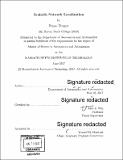Scalable network localization
Author(s)
Teague, Bryan (Bryan Andrew)
DownloadFull printable version (5.498Mb)
Other Contributors
Massachusetts Institute of Technology. Department of Aeronautics and Astronautics.
Advisor
Moe Z. Win.
Terms of use
Metadata
Show full item recordAbstract
This thesis introduces the Peregrine system, the first known real-time cooperative 3D wireless localization network. The Peregrine system comprises two major components: a hardware testbed; and a suite of distributed real-time algorithms to solve the highly interrelated problems of Node Prioritization, Node Activation, and Node Localization. Each node in the hardware testbed is a low-cost business card-sized device, made up of a microprocessor, a commercially available ultra-wideband (UWB) radio, and a small battery for portability. The algorithmic portion of the Peregrine system leverages recent research in the area of wireless network localization (WNL). Node Prioritization selects the best neighbor nodes for localization by solving a convex optimization problem that uses the squared position error bound (SPEB) as an objective function. Node Activation controls channel access through the calculation of a optimal binary activation probability. Node Localization is developed in the context of a globally optimum Bayesian estimation problem and solved by means of the sigma point belief propagation (SPBP) algorithm. SPBP calculates accurate position estimates from UWB range measurements by enabling spatial and temporal cooperation. The overall system performance and the impact of each algorithmic component is validated through indoor localization experiments. The results confirm that Peregrine is reliable and scalable while maintaining decimeter level position accuracy indoors.
Description
Thesis: S.M., Massachusetts Institute of Technology, Department of Aeronautics and Astronautics, 2017. Cataloged from PDF version of thesis. Includes bibliographical references (pages 69-73).
Date issued
2017Department
Massachusetts Institute of Technology. Department of Aeronautics and AstronauticsPublisher
Massachusetts Institute of Technology
Keywords
Aeronautics and Astronautics.